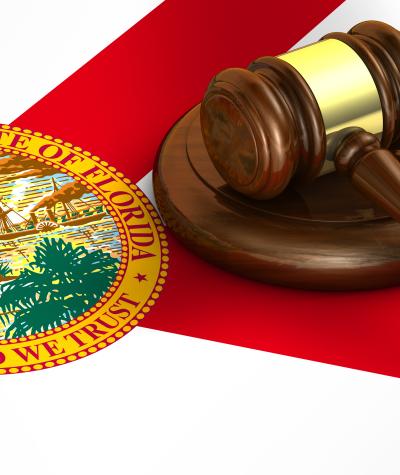The work of nonpartisan civic engagement groups like the League of Women Voters of Florida (LWVFL) is a core part of building a better democracy from the ground up.
These groups register voters, hold community educational events and promote civic engagement—yet their efforts have come under increasing attack by self-interested politicians, with the latest affront coming in Florida’s Senate Bill 7050 (SB 7050).
In May 2023, Campaign Legal Center (CLC) filed a lawsuit on behalf of LWVFL to block provisions of SB 7050 that would restrict and penalize basic nonpartisan civic engagement efforts.
In July 2023, a federal judge temporarily blocked enforcement of portions of the law — including one provision that would penalize organizations like LWVFL if any of their volunteers who help register voters are not U.S. citizens, as well as another that prohibits those groups from retaining a voter’s personal information, such as their name and phone number, even with the voter’s consent.
At the time, Chief Judge Mark Walker agreed the provisions were likely unconstitutional and severely curtailed civic groups' ability to engage with voters. “The Free State of Florida is simply not free to exceed the boundaries of the U.S. Constitution,” Walker wrote in his ruling.
Now, in May 2024, Judge Walker permanently blocked one of the severely restrictive provisions of SB 7050 that was temporarily blocked last year, which targeted nonpartisan civic engagement groups with substantial fines if noncitizens — including legal permanent residents — helped with nonpartisan voter registration drives.
Specifically, the most recent order strikes down a portion of the law that punished those groups with a $50,000 fine each time a noncitizen volunteer helped with voter registration work. The state never gave a coherent reason for discriminating against noncitizens and Chief Judge Mark Walker ruled that the provision violated the Equal Protection Clause of the 14th Amendment.
The ruling, which comes after three sets of plaintiffs challenged the law in court, is a win for democracy.
Nonpartisan civic organizations like LWVFL are now free to engage in some of their previous work without fear that they will be harshly penalized under the blocked provisions of the law. The ruling embodies the principle that, at the end of the day, folks helping their neighbors access and exercise their freedom to vote is one of the pillars of our democracy — and it’s something that we should encourage, not punish.
Last year's temporary blocking of restrictive provisions came down in the late afternoon on July 3, just hours before much of the country would begin celebrating our nation’s Independence Day. In that spirit, Chief Judge Walker’s conclusion touched on the patriotism inherent in fighting for a better democracy:
“Tomorrow, Floridians across the state will commemorate our Nation’s birthday…. And amid these patriotic festivities, some may feel moved, for the first time, to embrace their solemn privilege as citizens by registering to vote…. In doing so, they would embody those democratic ideals that, for nearly two hundred forty-seven years, have made our system the envy of the world.”

